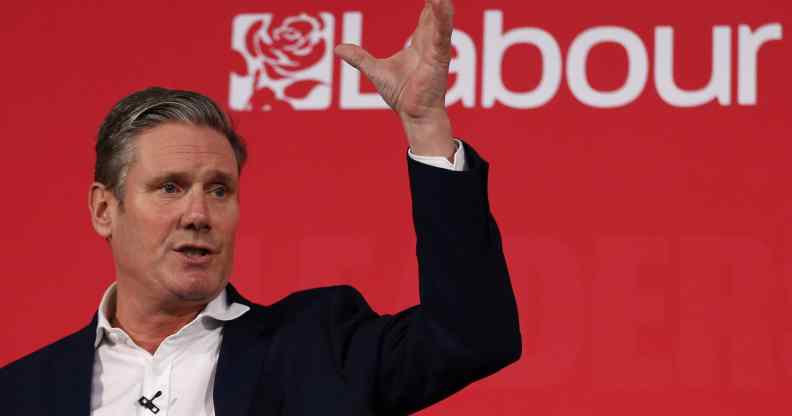Labour’s rampant transphobia problem is only getting worse under Keir Starmer, trans members say

Labour leader Keir Starmer. (Getty/ Hollie Adams)
Labour is enabling institutionalised transphobia, say trans members who’ve been forced to resign high-profile roles or quit the party entirely – and it’s time for Keir Starmer to take action.
Calls for Keir Starmer to condemn and address transphobia within the Labour Party have been mounting for over a year.
The issue first came to mainstream attention when, in August 2020, Canterbury MP Rosie Duffield waded into an online row about who has a cervix.
Despite an initial apology, Duffield dug in her heels on her “gender critical” views, even liking a tweet from anti-trans campaigner Maya Forstater that branded the Law Society’s guidance on transition in professional settings as “celebrating cross dressers in the office”, prompting blistering backlash from LGBT+ Labour members.
She has consistently maintained that she is not transphobic and that she supports the LGBT+ community. However, two staffers have resigned from her office over the issue. LGBT+ Labour has called for “swift action” to be taken against the MP, Labour activists have demanded that she have the whip withdrawn, and campaigners have begged Keir Starmer to take a stand. But the silence from Labour Party leadership has been – and remains – deafening.

Two of Rosie Duffield’s team quit over the MP’s allegedly “transphobic” views. (Facebook/RosieDuffieldCanterbury)
Starmer insists he is a “proud ally”, and since July it has been reported that Duffield is “under investigation” by Labour Party officials.
But tangible action is yet to appear, and while Duffield may have become the poster child for the party’s so-called “culture war” over trans rights, it is clear that this is not a problem rooted in one individual’s views. The Labour Party is enabling institutional transphobia, say trans members both former and present – and it runs deep.
The Labour Party has no definition of transphobia, tying its own hands when it comes to weeding out discrimination
In October 2020, the Equality and Human Rights Commission investigation into antisemitism in the Labour Party found that there had been “unlawful acts of discrimination and harassment”.
It was required to produce an action plan on tackling antisemitism, in which the party also committed to tacking “any discrimination based on protected characteristics” under the Equality Act 2010.
While “gender reassignment” is a protected characteristic, to date the Labour Party has produced codes of conduct which provide clear definitions of various kinds of discrimination, including Islamophobia, antisemitism, sexual harassment and racism. However, it has not done so for transphobia.
Further, the party’s policy on bullying and harassment makes no mention of trans people, gender identity or transphobia.
Dr Heather Peto, who quit as the first-ever trans co-chair of LGBT+ Labour in January but remains a party member, told PinkNews that this provides a way for Labour members to “get away with” transphobia if they are “not harassing a specific person”.
She said: “For example, sharing something that we regard as transphobic, without a code of conduct definition of transphobia within the party, it’s quite difficult for the party to take action on that… Technically, they’re not breaking the rules.”
When the Labour Party Annual Conference begins on Saturday (25 September), the issue of an official definition of transphobia will likely not be raised.
That, Peto says, means “going through a whole year of transphobic people in the Labour Party ganging up on trans people and calling it ‘freedom of speech’” before it can be raised at next year’s conference, although there is no guarantee that this will happen.
Silence on transphobia could be a political tactic by the Labour Party
A lack of code of conduct and specific definition of transphobia is clearly tying the Labour Party’s hands when it comes to disciplining those who engage in it. But the question remains as to why nothing is being done to remedy this.
Many interpret the silence of Labour leadership on transphobia as fear of associating with a “woke” cause, and losing more socially conservative voters because of it.
Arthur Webber is a trans man who ran as a Labour candidate for city council in Paston and Walton last year. This month, he resigned his membership of the party.
In his resignation letter, Webber said that he had first found a “safe haven” in his university’s Labour students club, and was again met with “love and acceptance” when he first attended a constituency Labour Party meeting. He eventually ran for councillor as an openly trans man, and was pleasantly surprising by the welcoming response of the public.
He wrote: “I did, however, receive online abuse from members of the same party.
“The party that loves to remind me that it wrote and passed the Equality Act (2010), but allows members to advocate for this law to be broken to exclude and marginalise transgender people.
“The party of the NHS that says nothing as trans people die on waiting lists for treatment that seemingly never end.
“The Labour Party that said it was for people like me, until it wasn’t.”
I have resigned from the Labour Party pic.twitter.com/YjjWjmBAaG
— Arthur Webber ?️?? (@BernieTranders) September 10, 2021
Webber has spent significant time trying to educate the Labour members around him, as well as Labour politicians in power, about the impact of transphobia within the party.
Now, however, Webber has come to the conclusion that education is not enough.
The Labour Party, he wrote, knows “full well” that transphobia among its members is causing harm to trans folk, but “does not value us enough to protect us from harm”.
Webber told PinkNews that in order to regain his support, the Labour Party would need to undergo a complete culture shift.
“The way you win votes from the Red Wall is not to completely ignore the plight of minority groups and say they’re not worth your time,” he said.
Webber feels frustrated when he sees his peers, some of whom have also resigned their membership, saying they would rejoin if Rosie Duffield had the whip withdrawn.
“I think because it’s not a problem that’s concentrated in any particular faction, it’s making it much harder to deal with,” he explained.
“Everybody’s focusing on the more vocal ones who tend to be on the right of the party, we also very much have a problem on the left of the party… It’s very much not a factional issue, yet people try to make is a factional issue, which makes it impossible to deal with.”
He added: “Unfortunately, as with everything in the Labour Party, factionalism is clouding everybody’s judgement.”
Transphobia in Labour didn’t start with Keir Starmer, but he has a responsibility to end it
Transphobia in the Labour Party isn’t limited to Keir Starmer’s leadership, and certainly goes deeper and further back.
But following recent discussion on reforming the Gender Recognition Act and the huge increase in anti-trans public discourse, his lack of action and decisiveness is all the more jarring.
The problem with Labour leadership “equivocating” on tackling transphobia, Heather Peto said, is that “if a leader does that, all the people that are opposed to trans rights and trans equality come out of the woodwork, and they try to claim to talk for the leader, or they try to set the agenda”.
Arthur Webber added that there are those within the party that think “everything was hunky-dory and rosy” under Jeremy Corbyn, “and it just wasn’t”.
“Jeremy also ignored institutional issues in relation to transphobia,” he said.
“Yes, it wasn’t as blatant as it is now… but it wasn’t as bad as it is now.
“I think some of that does have to be assigned to Keir Starmer’s leadership, and the people he has working with him.”
Further, those people that Starmer has working with him in Labour’s upper echelons are entirely cisgender.
“We don’t have any representation at the table where they decide things,” said Peto.
Earlier this year, Peto was involved in the launch of a new group named Labour Trans Equality, which aims to work within the Labour Party to promote trans and non-binary equality.
Their aims are “clear and simple”: To increase trans representation in the party by training and encouraging potential trans Labour members and candidates, and to “be a strong and clear voice for trans and non-binary members and their allies”.
The group has even been consulting on a definition of transphobia which it tried to submit to the NEC, but was “ignored”.
Wolverhampton councillor Anwen Muston, who was the first trans Labour councillor elected after 2000 and co-sponsor of Labour Trans Equality, told PinkNews that the most vital thing is for those in power to actually talk to trans people.
“Our parliament is not fit for purpose because it’s not representative of all the communities it serves,” Muston said.
“We’re excluded from it, we’re excluded from the decision-making.
“They talk about us: ‘Shall we give them this, shall we give them that?’ And it’s without us, where we should be included.”
But it’s an uphill battle.
The Labour Party has no trans MPs, no trans members of its National Executive Committee (NEC), and the idea of a trans person in a senior leadership position seems like a near-impossible dream.
Trans people in the Labour Party have been disappointed by their cisgender allies, who on the whole seem to be avoiding the work required to tackle transphobia in the party.
Taking on the fight without cis allies by their side is an even more monumental task when trans folk are struggling to get a seat at the tables that matter most.
A Labour spokesperson said: “The Labour Party is absolutely committed to advancing trans rights and we continue to support updating the GRA to introduce self-declaration for trans people and upholding the Equality Act. We are also committed to improving the diversity of our elected representatives.
“Trans people are one of the most discriminated against groups in society. The Labour party will ensure every trans person can live with respect and dignity in an equal and inclusive society.
“We are committed to introducing a transphobia code of conduct as soon as possible and will be working with our stakeholders to prepare guidance that can be used in the interim.”

